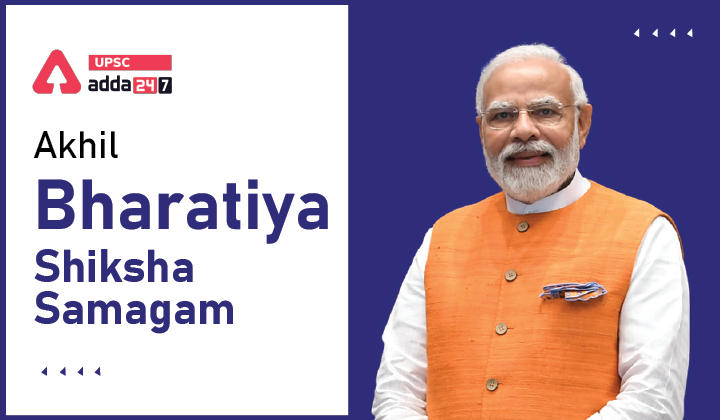Table of Contents
Akhil Bharatiya Shiksha Samagam- Relevance for UPSC Exam
- GS Paper 2: Governance, Administration and Challenges- Government policies and interventions for development in various sectors and issues arising out of their design and implementation.
Akhil Bharatiya Shiksha Samagam in News
- Prime Minister Shri Narendra Modi will inaugurate a three day Akhil Bharatiya Shiksha Samagam at Varanasi, Uttar Pradesh.
Akhil Bharatiya Shiksha Samagam
- About: Akhil Bharatiya Shiksha Samagam is a three day conference that is being organized to deliberate on how the implementation of National Education Policy 2020 can be taken further across the country after successful implementation of several initiatives in the last two years.
- Mandate: Akhil Bharatiya Shiksha Samagam is to-
- Provide a platform for thought-provoking discussions that will articulate the roadmap and implementation strategies, foster knowledge exchange and
- Build networks through interdisciplinary deliberations and discuss challenges being faced by educational institutions and articulate solutions.
- Organizing Institutions: Akhil Bharatiya Shiksha Samagam is being organized by the Ministry of Education in association with University Grants Commission and Banaras Hindu University.
- Participation: Akhil Bharatiya Shiksha Samagam will bring together over 300 Vice Chancellors and Directors from public and private universities, educationists, policy makers, as also industry representatives to deliberate about implementation of nep-2020.
- Key Themes: Discussions in Akhil Bharatiya Shiksha Samagam will be held on the following key themes-
- Multidisciplinary and Holistic Education,
- Skill Development and Employability,
- Indian Knowledge Systems,
- Internationalization of Education,
- Digital Empowerment and Online Education,
- Research, Innovation and Entrepreneurship,
- Quality, Ranking and Accreditation,
- Equitable and Inclusive Education,
- Capacity Building of Teachers for Quality Education.
- Significance: Akhil Bharatiya Shiksha Samagam will result in the adoption of the Varanasi Declaration on Higher Education which will showcase India’s extended vision and a renewed commitment to help achieve the goals of higher education system.
Key points About NEP-2020
- It is the third education policy of our country. The earlier two was launched in 1968 and 1986.
- This national policy came after a gap of 34 years.
- It is based on the recommendations of Kasturirangan committee.
- It renames the Ministry of Human Resource Development to Ministry of Education.
- It proposes a 5+3+3+4 curricular and pedagogical structure.
| Stages | Years | Class | Features |
| Foundational | 3-8 | 3 years of pre-primary and 1-2 | Flexible, multi-level, activity-based learning |
| Preparatory | 9-11 | 3-5 | Light textbooks, more formal but interactive classroom learning |
| Middle | 12-14 | 6-8 | Introduction of subject teachers for learning of more abstract concepts, experimental learning |
| Secondary | 15-18 | 9-12 | Reading in-depth, critical thinking, greater attention to life aspirations |
Implementation of NEP-2020
- There will be an apex body called Higher Education Commission of India (HECI), which will resolve disputes among the following bodies.
| Bodies | Features |
| NHERA (National Higher Education Regulatory Authority) | Light but tight regulation |
| NAC (National Accreditation Commission) | Meta-accrediting agency |
| HEGC (Higher Education Grants Council) | Responsible for funding |
| GEC (General Education Council) | frame expected learning outcomes for higher education programmes. |



 TSPSC Group 1 Question Paper 2024, Downl...
TSPSC Group 1 Question Paper 2024, Downl...
 TSPSC Group 1 Answer key 2024 Out, Downl...
TSPSC Group 1 Answer key 2024 Out, Downl...
 UPSC Prelims 2024 Question Paper, Downlo...
UPSC Prelims 2024 Question Paper, Downlo...




